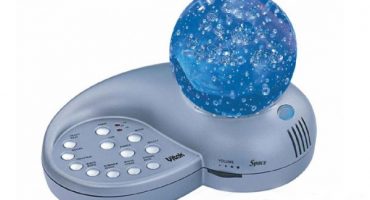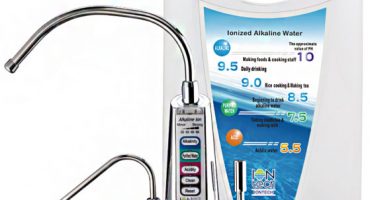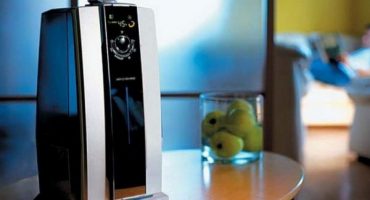- What is an air ionizer and why is it needed
- The device and principle of operation of the air ionizer
- Advantages and disadvantages of ionizers
- Varieties of ionizers
- Features of air ionization using NANOE technology
- Rules for using an ionizer
- Contraindications to using the device
- Air ionization, as an additional option in cars, household appliances
- Myth or reality
Cleanliness in the house is the guarantee of the health of all its inhabitants. The most important criterion is the quality of the inhaled air. But sometimes even thorough cleaning, regular ventilation, and the use of fresheners do not give the desired result. In the rooms there is stuffiness, stale air, an unpleasant smell, which not only cause physical and emotional discomfort, reduce efficiency, but also provoke the appearance of various diseases.
The use of an ionizer will solve the problem. What benefits does this device bring? What is the principle of operation of a typical air ionizer?
What is an air ionizer and why is it needed
Ionization is a fashionable term that is currently being heard. But it is not clear to all consumers what the process is and why it is needed.
For normal life, a person must breathe clean air, saturated with light ions (aero ions). They are formed due to separation from molecules / atoms of an electron under the influence of atmospheric electricity and various types of radiation.
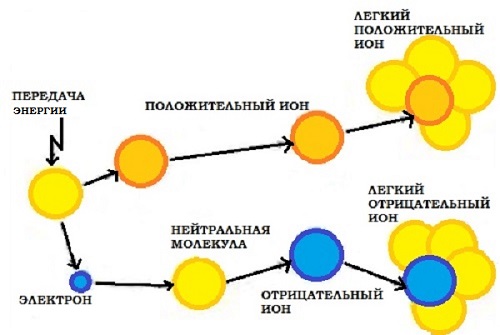
Scheme of formation of light positive and negative ions
These charged particles of gas have a positive effect on the mucous membranes of the respiratory system, contributing to the production of biologically active substances. They also saturate the body with energy, increase its protective functions, normalize the work of many systems and organs, stimulate mental and physical activity, increase muscle tone, slow down aging.
The need to install an air ionizer in the apartment
In nature, air ionization takes place independently. But the concentration of ions in it is not constant. Their level depends on the degree of environmental pollution, season, weather conditions.
The highest concentration of ions in the air in the forest, mountains, villages, by the sea. Their number is 600-50 000/1 cm2. Therefore, in these areas it is so easy to breathe. In the city there are many factories, vehicles, electrical appliances, which significantly reduces the level of ions in the air. In addition, a person himself produces heavy ions - the more people in the room (office, apartment), the more difficult it is to breathe. The concentration of light ions in such places can be reduced up to 15 times. As a result, a person feels ionic starvation, manifested by fatigue, headaches, general weakness.

The content of air ions in various areas
Under conditions of weak ionization, it can be carried out artificially - using a special device. The main purpose of ionizers is to increase the volume of living air in rooms by saturating it with negatively charged oxygen ions.
The device and principle of operation of the air ionizer
The device, which enriches the air with charged ions (negative, negative and positive), has a compact size and is powered by a standard power supply.It can be either stand-alone or mounted in a specific device (for example, a hairdryer, air conditioning).
The principle of operation of a typical air ionizer is in needle or wire electrodes. Between them, under the influence of an electric current, a high voltage field is formed. The electrodes produce electrons that, when they collide with air molecules, knock free electrons out of them, forming ions with a negative charge.
The device generates ions at a speed of 1 µA (several billion charged particles / second).

Air ionizer operation diagram
This device can be used in residential and office premises in order to improve the air quality that a person breathes, accelerate the decay of harmful substances (dust, tobacco smoke), and destroy pathogenic microorganisms.
Advantages and disadvantages of ionizers
The main advantages of these devices:
- improving air quality, cleaning it from allergens, dust, pathogens, ticks;
- elimination of unpleasant odors, tobacco smoke;
- high performance with compact dimensions and low power;
- ease of maintenance;
- the ability to adjust the operating mode;
- low noise level;
- the presence of additional functionality (purifier / humidifier, flavor, fan).
Among the disadvantages of ionizers of this kind:
- the need for periodic cleaning of needles / cassettes. The care of most models is minimized - it is enough to wash their filters under running water 1-2 times / month;
- Unexpected effect of the electric field on a person. For some people, electromagnetic radiation is good, for others it is harmful. It is impossible to foresee;
- the need for regular cleaning of the space around the device. The ionizer gives a negative charge to the microflora of the room, so micropowers will fall near it (on furniture, floor);
- the negative effect of an excess of positively charged ions on a person. Ozone, released in large quantities, causes a headache, lethargy, and poor health. A characteristic sign of its increased concentration in the air is the “thunderstorm smell”.

The ionizer will be beneficial if it is selected taking into account the area of the room, the degree of air pollution in it, installed at a safe distance from the person, used according to the instructions
Varieties of ionizers
Distinguish devices for air enrichment with ions:
- unipolar;
- bipolar.
How to choose the right one air ionizer for an apartment? A unipolar device generates only ions with a negative charge. For a long time it was believed that this is enough for a person, since he receives positive particles from the air. But recent studies have shown that people need both types of ions. If a person receives exclusively negative ions, they simply do not reach the lungs. Therefore, it is better to choose a bipolar device that generates particles with both positive and negative charges.
The principle of operation of this ionizer is based on the occurrence of a corona discharge under the influence of high voltage. Due to this, the device alternately generates ions with either a positive or a negative charge. It can be turned on while people are indoors.

Comparison of the principles of operation of unipolar and bipolar ionizers
The ionizer can be presented as a stand-alone device or built-in - mounted in another unit (humidifier, hair dryer, air conditioner, heater) as an additional option. In the first case, it has larger dimensions, in the second - it differs in compact dimensions, easily fits inside the device.
The ionizer in a hair dryer for drying hair protects them from dehydration and drying. That is, during the drying process, the hair does not lose moisture due to the action of ions.
A heater with a built-in ionizer performs two functions simultaneously.This is heating the air and saturating it with aeroions, which makes you feel better even indoors.
Humidifier with ionizer and conventional ionizer: which one to choose
Creating a favorable microclimate in the house, many consumers tend to buy appliances that combine several functions. So instead of a conventional ionizer, a humidifier with an additional function of enriching the air with ions is preferred. But is acquiring such a device justified?
Some climate experts believe that the humidifier creates a favorable environment for the propagation of microorganisms that spread throughout the room with a stream of ions. Therefore, when using such a device, additional care must be taken to disinfect the air.
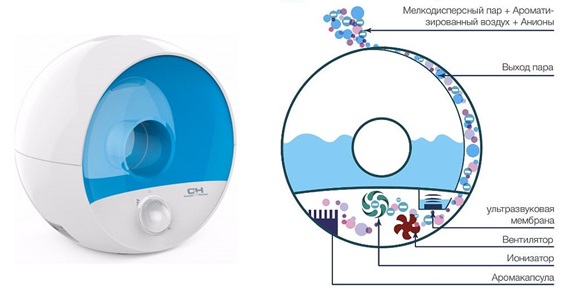
A humidifier with an ionizer will be appropriate in rooms where dry air
There are appliances such as the Super Plus Turbo that offer multi-stage air purification. The stream containing dust, smoke, microbes is sucked into a special cassette, where it can be affected by an electric charge. Pollution remains on the sedimentation plates, and clean air is enriched with ions formed in the corona discharge zone.
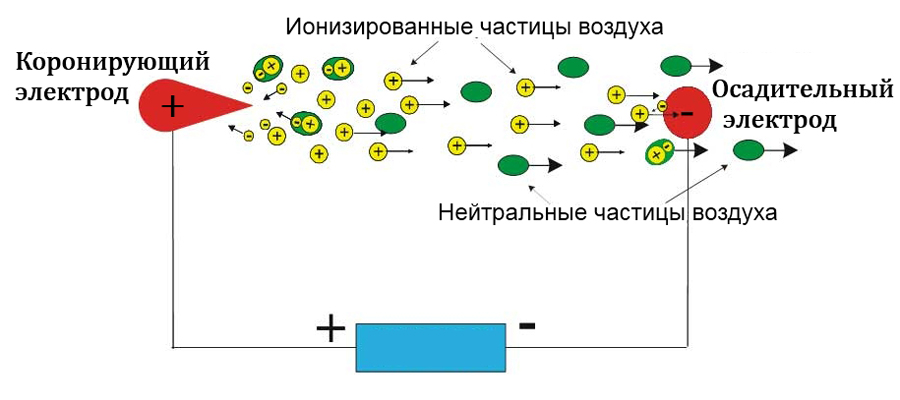
The Super Turbo Plus ionizer cleans and ionizes the air in accordance with sanitary standards
How this device works and what benefits it brings, the video will demonstrate:
To date, entire climate systems have been developed with many different functions. They are able to heat / cool air, purify and ionize it, moisturize. In addition, a fan, a thermometer, and even an electronic clock can be mounted in these devices.
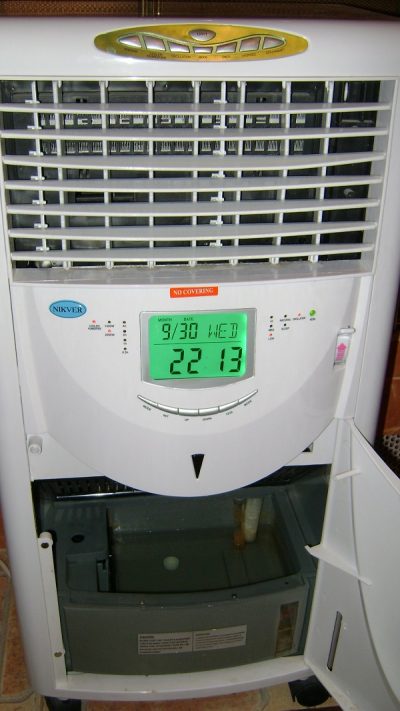
Modern climate systems are equipped with air purification and enrichment functions, which makes them useful in everyday life and safe for humans
Features of air ionization using NANOE technology
This technology was developed specifically for Panasonic. Its essence is to clean and refresh the air with the help of nanoions. These are microparticles-radicals surrounded by small water molecules with a size of 5-20 nanometers. Thanks to the hydro-shell, they are more effective than ordinary ions: they can travel long distances, act for a long time, penetrate deep into hard-to-reach places, destroying pathogenic microorganisms.
How do nano particles work? After their generation by the device, they disperse in the air, enveloping themselves viruses and allergens. Thus, nano-particles suppress the action of bacteria harmful to humans. Due to its microscopic size, they are able to penetrate even into the tissue (which steam cannot), destroying dust, stubborn odors, and dust mite waste products there.
Note: the size of nano-particles is less than vapor particles by 1 milliliter times.

The principle of exposure to nano particles
Ionization nano-e is absolutely safe for humans, because its main active ingredients are water molecules. Unlike air molecules, they do not react with nitrogen compounds, so nano-ionization can be used in rooms where people are present.

Nanoions accelerate the process of humidification by 3 times, increasing its quality by 2 times
Rules for using an ionizer
The ionizer can be mounted on a wall, ceiling, put on the floor or on a pedestal. It should be borne in mind that the device must be at a certain distance from a person. This indicator is usually indicated in the data sheet of the device and ranges from 1 to 3m.
If you want the ionizer to absorb harmful radiation from the TV, it is mounted on the nearest wall. The device should be 0.5m above the monitor.
Attention: Do not install an ionizing device near the air conditioner, heater!
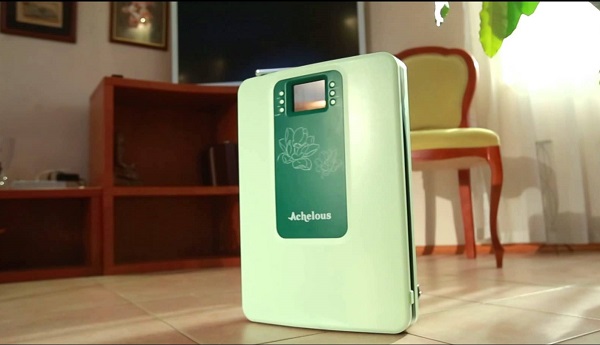
The efficiency of its work, the effect of the device on a person depends on the location of the ionizer
Is it allowed to stay indoors while the appliance is on?
If the ionizer is used only to improve the composition of the air, and not as a therapeutic agent, you should not be near it. When the process of cleaning the airspace begins, this time is best spent outdoors. In order to prevent and treat various diseases, the device is turned on for a specific time (specified in the instructions), located at a certain distance from the person.
How to check if the air ionizer is working?
Having bought a device to improve the quality of indoor air, many consumers do not know how to check its performance. Indeed, the evaluation of the functioning of the device can be quite subjective - the produced ions are not visible to the eye and are not noticeable.
There are several ways to check the operation of an air ionizer:
- a slight breeze is felt near the needles of the emitter of the device - high electron activity forms air vibrations;
- in the dark, a faint bluish glow is visible at the tips of the ionizer needles.
Note: there is a special device that allows you to measure the number of negative ions generated by the ionizer. However, to acquire it only for these purposes is impractical.
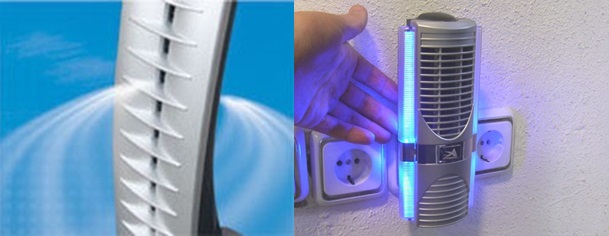
Methods for checking the operation of the device
How long do I turn on the ionizer?
The time required to saturate the air with light ions is individual for each room. It depends on how many people are constantly in the room, household appliances. The optimal rate is 1-2 hours / day. If the TV / computer is constantly working in the room, ionization can last up to 12 hours. The device must not operate continuously, the maximum permissible operating time is indicated in the manual for its use.
When using the ionizer for prophylactic purposes (to prevent diseases of the respiratory tract, heart and blood vessels), it is included 2-3 times / day for 10 minutes. In this case, a person should be 0.5-1 m from the device. To accelerate wound healing, the flow from the apparatus is directed to a sore spot and left to act for 5 minutes.
Please note: an ionizer cannot replace a full-fledged ventilation of a room, but only improve the quality of the air in it. These two processes should be carried out at different times, since there is no point in enriching the gas mixture that is changing in the room with ions.

The exposure time of the device depends on the expected result (air enrichment, treatment, disease prevention), its location in relation to the person
Care
The ionizer should be regularly cleaned from dust. After the session is completed, it is necessary not only to turn off the toggle switch, but also to disconnect it from the power supply. A regular filter should be washed with water once / 2 weeks. The Hepa filter, which captures the smallest particles, is conveniently cleaned with a vacuum cleaner.
Contraindications to using the device
When the device is functioning indoors, do not smoke - this helps to get more carcinogens into the lungs. Ionization should be abandoned if the house has a small child, a cancer patient or a person sensitive to ozone.
You should not use the device if someone at home has a fever - the fever may increase. If the ionization procedure worsens the well-being of people (causes headache, irritability, nosebleeds), it should be stopped. This reaction can be triggered by the formation of ozone. After a while, she may pass.

The reaction to the device is difficult to predict, so it should be switched on for 10-15 minutes at first, placed at a safe distance from people
Air ionization, as an additional option in cars, household appliances
If a person spends a lot of time in a car, his health often worsens, he has a headache, drowsiness, and a concentration of attention decreases. The reason for this is the gas pollution of the city air, the accumulation and mixing of various odors in the cabin - that is, a decrease in the level of negative ions.
Ventilation through open windows does not give the desired result, since street airspace is not always clean. In this case, an ionizer will be useful. It generates negatively charged ions, which not only improve the quality of air in the passenger compartment, but also neutralize various allergens, dust, and harmful impurities.
Note: the car ionizer can be additionally equipped with a fan, filter, aroma block, which increases the functionality of the device.

The ion generator is attached to the ceiling of the car or installed in the cigarette lighter
In household appliances, the ionization function is also necessary. So hair dryers for drying and styling hair dry and electrify the hair. And the ionization function allows you to create a stream of negative ions, which remove static, soften strands, make them smoother, brighter and more manageable. They accelerate the drying process, while maintaining moisture inside the rods.
Please note: ions do not restore and do not heal hair, they only reduce the damage that drying and styling can cause them with a hot hairdryer.
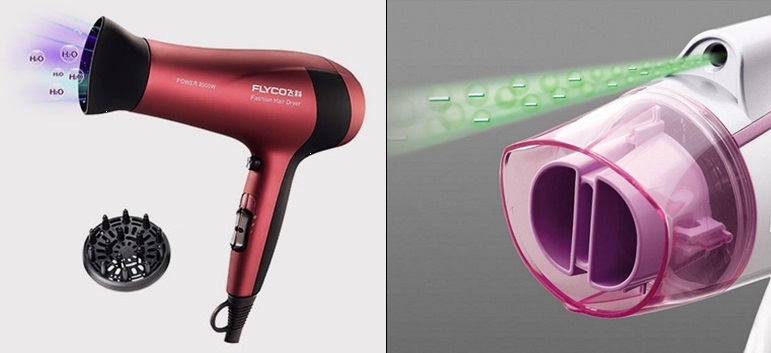
Hair dryers can be with either an internal or external ionizer
A lot of talk is about the dangers of heaters, air conditioners for humans, the environment, because any unit of portable heating drains the air in the room, reduces its quality. An ionizer will prevent this. Mounted in the unit for heating the room, it provides a comfortable microclimate for humans, has an antibacterial effect, eliminates unpleasant odors, and neutralizes harmful chemical compounds.
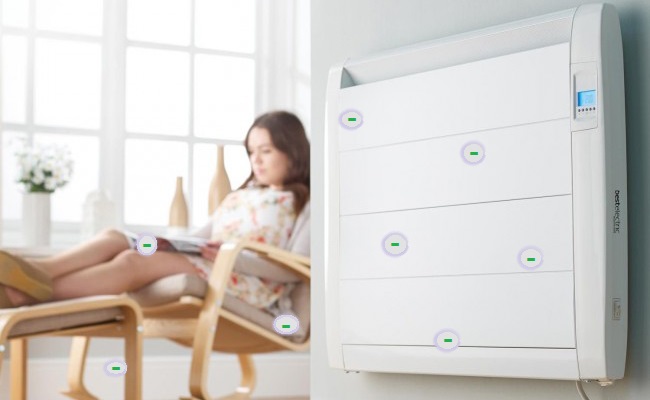
The ionizer is able to recreate the natural microclimate in an apartment
Myth or reality
It is important for a person to breathe clean air to maintain the health of the body, well-being. But the use of household ionizers causes controversy among specialists in air conditioning. The fact is that the result of their use is close to the placebo effect.
Should I use an air ionizer? Of course, yes. But it is important to understand that this is not a panacea for all diseases. Subject to the rules of use, the device can significantly improve the composition of air in the room, thereby benefiting the people in it.
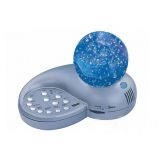 How to install a water and air ionizer
How to install a water and air ionizer 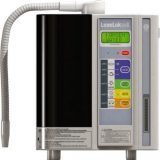 Do-it-yourself water ionizer: diagram and instructions
Do-it-yourself water ionizer: diagram and instructions 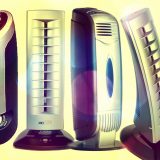 Ionization of air - what is it and why is it needed
Ionization of air - what is it and why is it needed 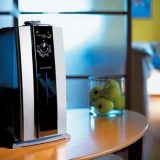 Useful or harmful air ionizer in the apartment
Useful or harmful air ionizer in the apartment 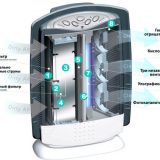 What is better ionizer or air ozonizer and what to choose
What is better ionizer or air ozonizer and what to choose 